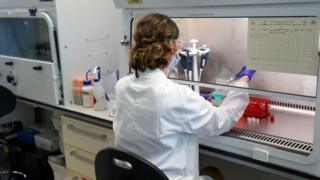 Image copyright
Reuters
Image copyright
Reuters
Trials of a Covid-19 vaccine being developed by AstraZeneca and Oxford University will resume after it was paused due to a reported side effect in a patient in the UK.
On Tuesday, AstraZeneca said the studies were being paused while it investigated whether the reported side effect was connected with the vaccine.
But on Saturday, Oxford University said it had been deemed safe to continue.
The vaccine is seen as a strong contender among dozens being developed.
Oxford University said in a statement that it was "expected" that "some participants will become unwell" in large trials like this one.
The government's chief scientific adviser, Sir Patrick Vallance, echoed this view, telling a Downing Street press conference on Wednesday what had happened in the Oxford trial was not unusual.
The university added that the studies could now resume following the recommendations of an independent safety review committee and the UK regulator, the Medicines and Healthcare Products Regulatory Agency.
Oxford University said it would not disclose information about the patient's illness due to confidentiality reasons, but the New York Times reported that a volunteer in the UK trial had been diagnosed with transverse myelitis, an inflammatory syndrome that affects the spinal cord and can be caused by viral infections.
Hopes have been high that the vaccine might be one of the first to come on the market, following successful phase 1 and 2 testing.
Its move to Phase 3 testing in recent weeks has involved some 30,000 participants in the US as well as in the UK, Brazil and South Africa. Phase 3 trials in vaccines often involve thousands of participants and can last several years.
The World Health Organization (WHO) says nearly 180 vaccine candidates are being tested around the world but none has yet completed clinical trials.
US President Donald Trump has said he wants a vaccine available in the US before 3 November's election, but his comments have raised fears that politics may be prioritised over safety in the rush for a vaccine.
But the WHO's chief scientist has said that countries must not start "cutting corners" in the race to develop a vaccine.
"Just because we talk about speed and scale doesn't mean we start compromising or cutting corners on what would normally be assessed," Dr Soumya Swaminathan said on Wednesday.
"The process still has to follow through rules of the game. For drugs and vaccines which are given to people, you have to test their safety, first and foremost," she said

 5 years ago
642
5 years ago
642 

